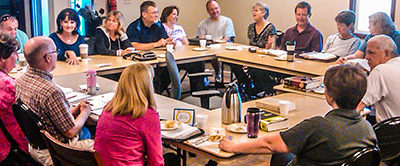IT MAY SOUND IRREVERENT but I think of Sunday worship in church as Show and Tell.
The worship service is the Show.
The Bible study or Sunday School—if your seeker-sensitive church staff will let you call it Sunday School—is the Tell. That’s where we get to talk back and say things like, “Hey, wait a minute. Where did you come up with that idea?”
I think most pastors would hate hearing me call the worship service a Show.
But by just about any definition I can think of, it is.
We sit and watch a carefully scripted parade of performers sing, read, pray, speak. Each one gets their moment in the spotlight.
To a great extent during the Show, the rest of us are passive.
Just as we would be in a theater or watching TV at home.
Certainly, we’ll react in church: Laugh, nod in agreement, cry, and sing along when requested.
But we’d do all of that while watching any other show, too.
In church there’s the Holy Spirit factor. God talks to us when we sit and listen to him in church.
But aren’t we moved by the Holy Spirit while watching other shows? Just about any Hallmark movie, for example. [Note to Hallmark: Ad space available.]
On Sundays in my church, the Show is wonderful.
It’s engaging, uplifting, and relevant to what’s going on in my life—the music as well as the sermon.
But when I have to choose between Show and Tell, as I sometimes do, I almost always choose Tell.
Bible study. Adult Sunday School.
I get to read the Bible with fellow Christians. I get to discuss various takes on what the writer might have been trying to say. And I get to explore what on earth any of it has to do with me.
In the Show, I can’t politely interrupt the pastor and say:
- “I don’t understand what you just said.”
- “What’s your source of authority for making a sweeping statement like that?”
- “I know of another way scholars interpret that Bible quote.”
But I can do that to a Bible study leader. And I do. And I get it done to me, too, when I’m taking my turn leading the discussion.
In my experience, the Tell part of Sunday worship takes more brainpower than the Show because you have to think hard to ask good questions—and even harder to work up a good answer.
The Tell can be even more moving—especially when you and your friends are bonded close enough to exchange deep personal concerns or praises, as my friends and I are in the class I attend.
Generally, the Show gets most of the energy, the publicity, and as a result, the warm bodies.
But it has been my observation over the years that the Tell is where we’ll find most of the engines that drive the church.
The Tell was where it all started, anyhow.
The first generation of Christians met in small groups to explore the teachings of Jesus and to find ways to spread the word.
That seems to me like a good thing for any generation of Christians to do.


Very nicely put, Steve! A relationship with God, his church and his word was never meant to be a passive experience.